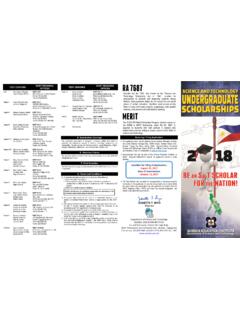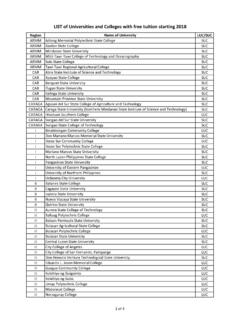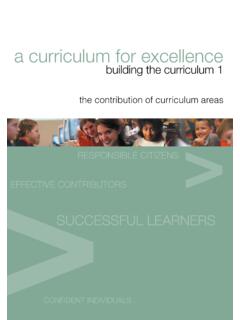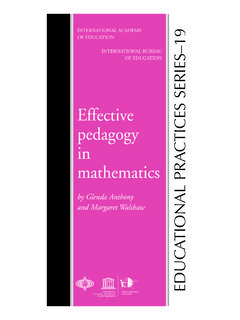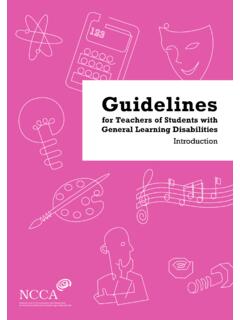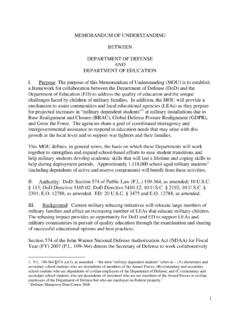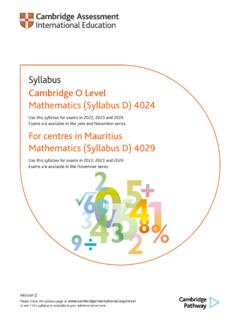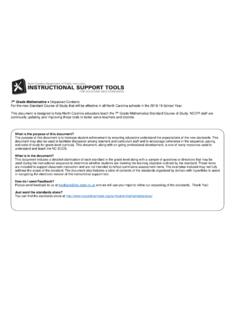Transcription of FRAMEWORK FOR PHILIPPINE SCIENCE TEACHER …
1 FRAMEWORK FOR PHILIPPINE SCIENCE TEACHER . EDUCATION. Department of SCIENCE and Technology SCIENCE EDUCATION INSTITUTE. University of the Philippines National Institute for SCIENCE and mathematics Education development FRAMEWORK for PHILIPPINE SCIENCE TEACHER Education All rights reserved. 2011 by the SCIENCE Education Institute, Department of SCIENCE and Technology (SEI-DOST). and the University of the Philippines National Institute for SCIENCE and mathematics Education development (UP NISMED), Manila, Philippines Citation: SEI-DOST & UP NISMED, (2011).
2 FRAMEWORK for PHILIPPINE SCIENCE TEACHER education. Manila: SEI-DOST & UP NISMED. ISBN 978-971-8600-45-0. Published by: SCIENCE Education Institute, Department of SCIENCE and Technology 1st and 2nd Levels, SCIENCE Heritage Building DOST Compound, General Santos Avenue Bicutan, Taguig City, Metro Manila, Philippines Tel. Nos. (632) 837-1359, (632) 839-0241, Fax No. (632) 837-1924. / and University of the Philippines National Institute for SCIENCE and mathematics Education development E. Quirino Avenue, UP Campus Diliman, Quezon City 1101 Philippines Tel.
3 No. (632) 927-4276, Fax No. (632) 928-3545. ~ismed/ e-mail: Request for permission to use any material from this publication or for further information should be addressed to the copyright holders. Printed in Metro Manila, Philippines Foreword This FRAMEWORK is the product of months of careful planning and discussions, with ideas coming from the best minds in the field of SCIENCE , prior to the actual drafting of the manuscript. Although there may have been opposing views during the development of this FRAMEWORK , which is not unusual when experts meet, the final output is proof that individuals with diverse backgrounds and beliefs could be united by a common vision and goal.
4 The FRAMEWORK for PHILIPPINE SCIENCE TEACHER Education contains resources that will help TEACHER education institutions, university SCIENCE professors and school administrators assess and improve the performance of SCIENCE teachers using standards-based rubrics. The qualities of effective SCIENCE teachers in terms of what they should know (knowledge), what they are expected to do to achieve quality learning outcomes (practice) and what they should possess to be able to embrace change and sustain professional growth (attributes). are also included.
5 All these are anchored on the objective of raising the quality of SCIENCE education. It is hoped that this FRAMEWORK will be widely used and applied by the various stakeholders, and that together we will work towards achieving the desired goal of effective SCIENCE teaching among our teachers. Dr. Filma G. Brawner Director, SCIENCE Education Institute Contents Chapter 1. Introduction .. 1. Mission of Schools and TEACHER Education Programs .. 1. SCIENCE Education in the Philippines: Challenges and Prospects .. 1. Reforms in SCIENCE Education: What Other Countries Are Up To.
6 8. Towards a Standards-based SCIENCE TEACHER Education .. 10. Chapter 2. Guiding Principles in the development of the FRAMEWORK for SCIENCE TEACHER Education .. 12. Reviewed Documents .. 12. The Proposed SCIENCE Curriculum FRAMEWORK for Basic Education .. 12. The National Competency-based TEACHER Standards .. 14. The School-based Training Standards .. 15. The Revised Policies and Standards for Undergraduate TEACHER Education Curriculum (CMO 53 s 2005) .. 15. The National professional Standards for Highly Accomplished Teachers of SCIENCE .. 16.
7 The Guiding Principles in the development of the FSTE .. 16. Chapter 3. Qualities of Effective SCIENCE Teachers .. 18. professional Knowledge .. 19. professional Practice .. 22. professional Attributes .. 31. Chapter 4. Evaluating the Performance of SCIENCE Teachers Using Standards-based Rubrics 35. Rubrics for professional Knowledge .. 37. Rubrics for professional Practice .. 38. Rubrics for professional Attributes .. 40. Chapter 5. continuing professional development for SCIENCE Teachers .. 42. professional development Programs for Practicing Teachers (INSET).
8 43. Suggested Revisions for BEED and BSED Program, Major in SCIENCE .. 48. References .. 52. Appendices 1 National Competency-based TEACHER Standards 2 Tartu Declaration of SCIENCE and Technology CHAPTER 1. Introduction The mission of schools is to educate children to higher standards of performance by providing them with the experiences necessary to learn, define, analyze, adapt and invent. This statement was made in 1994 by Linda Darling- Hammond, Executive Director of the National Commission on Teaching and America's Future. Mission of Schools and TEACHER Education Programs This same mission is echoed by schools not only in the Philippines but all over the world.
9 The Hammond Report also emphasized that teachers who will successfully carry out this mission need to be well-prepared and well-equipped. They need to be grounded deeply in subject matter, knowledge of children's cognitive, social and personal development , and learning and motivation. In addition, they should have deep-rooted knowledge of varied approaches to teaching strategies, collaborative learning techniques, creative ways to implement the curriculum and use technology tools as well as effective assessment practices. Raising the learning standards can be achieved through a responsive TEACHER preparation program and continuing professional development program for all practicing teachers.
10 SCIENCE Education in the Philippines: Challenges and Prospects In the Philippines, recent efforts have been directed to improving SCIENCE education, both at the basic and TEACHER education levels. Research shows that the quality of SCIENCE education in schools is greatly influenced by the quality of SCIENCE teachers. Students' interest in SCIENCE is directly linked to the quality of teaching as well as learning interactions provided by their SCIENCE teachers. Interviews with students who excelled in SCIENCE reveal that they were greatly inspired by SCIENCE teachers who engaged them in tasks that enabled them to inquire and solve problems.
